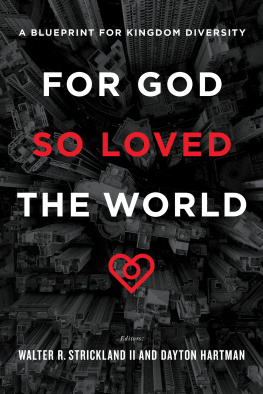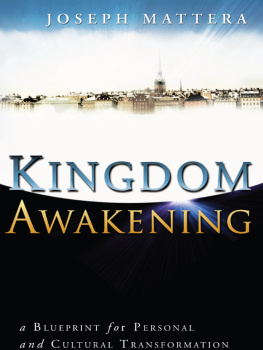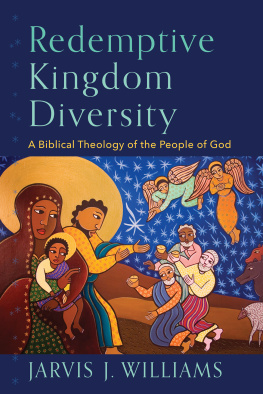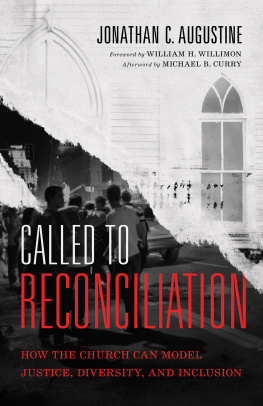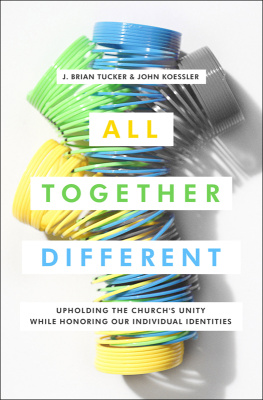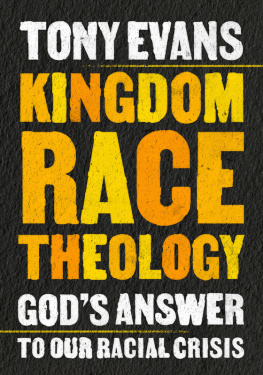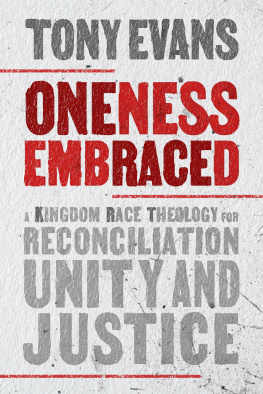In this volume, significant voices within the Southern Baptist Convention candidly engage the denominations turbulent past surrounding race and gender roles. The essays are at once historical, biblical, personal, and practical. These are not easy or comfortable discussions, but the authors write with an irenic spirit that should encourage ongoing dialogue and constructive change.
M. Daniel Carroll R. , Blanchard Professor of Old Testament, Wheaton College
Oh, how our generation needs the mind and voice of Walter Strickland and Dayton Hartman! They have come to the rescue again. I have long wrestled with what I sense is a kind of theological imperialism imposed upon people of color in these yet to be United States. Its a fragile matter handled with care and depth in these pages. We say that we believe that all mankind is made in the image and likeness of God. This text gives us a way to align our explicit theology with our implicit action. Read it and weep.
Charlie Dates , senior pastor, Progressive Baptist Church
The American church has not always loved people well, and as followers of Jesus, we have an opportunity to change this not only within our churches but within ourselves as well. To become people who seek true kingdom diversity by living our lives in a way that values all people. As someone who not only wants to love everyone well, and as someone who wants to teach others to love him well, I found this book to be a wealth of information and encouragement. There were parts of which I found myself reading over and over again, sometimes in disgust and sometimes in awe. Pick this book up only if you are willing to acknowledge where we have gone wrong and willing to forge a new path full of love, grace, and truth for all people made in the image of God.
Jamie Ivey , podcast host of The Happy Hour with Jamie Ivey
I commend the contributors to this timely and challenging volume for tackling some of the most confounding issues facing the church today. Regardless of your perspective on those issues, you will profit from reading this book.
Thomas S. Kidd , distinguished professor of history and James Vardaman Endowed Professor of History, Baylor University
Human cultures and ethnicities reflect the abundance and creativity of Gods nature. Yet, at the same time, they create barriers that we sometimes struggle to overcome. For God So Loved the World addresses the challenges and gifts of human difference and diversity, along with the unity that comesor should comefor all who are in Christ. I dont think Ive ever read a book that so holistically, comprehensively, and convincingly addresses the beauty and richness of Gods kingdom, both now and to come.
Karen Swallow Prior , research professor of English and Christianity & Culture, Southeastern Baptist Theological Seminary
For God So Loved the World is a much-needed entry in literature on diversity within the church. It needs to be read by anyone who wants to be part of making our Christian communities more diverse. The all-star lineup of writers provides important information and challenges us to do what we can to enhance diversity within the body of Christ. The book is theologically sound and will resonate with those who take seriously the Word of God. Read this book and then give it to a friend. Think about these issues. That is how we are going to find solutions that move us away from Sunday morning being the most segregated time of the week.
George Yancey , professor of the social sciences, Baylor University
For God So Loved the World: A Blueprint for Kingdom Diversity is so thoughtful and so affective I could not put this tour de force down until every word was consumed. Rooted in Scripture, these inerrantists also listen carefully to the cultures they engage for the Great Commission. Todays most important theological locusanthropologyis treated in its biblical, historical, and practical dimensions. The voices of African, Anglo, Asians, and Hispanic Americans, both women and men, advance human dignity better than anyone has yet done. Strickland and Hartman, Akin and Ashford, and Bowen and Whitfield, along with many others, paint a vision that I pray all Baptists and Evangelicals will now embrace and never relinquish.
Malcolm B. Yarnell III , research professor of systematic theology, Southwestern Baptist Theological Seminary, and teaching pastor, Lakeside Baptist Church
For God So Loved the World
Copyright 2020 by Walter R. Strickland II and Dayton Hartman
Published by B&H Academic
Nashville, Tennessee
All rights reserved.
ISBN: 978-1-4627-7831-7
Dewey Decimal Classification: 305.8
Subject Heading: ETHNIC RELATIONS / RACISM / MULTICULTURALISM
Unless otherwise noted, Scripture quotations are taken from the Christian Standard Bible, Copyright 2017 by Holman Bible Publishers. Used by permission. Christian Standard Bible and CSB are federally registered trademarks of Holman Bible Publishers.
Scripture quotations marked KJV are taken from the King James Version.
Scripture quotations marked RSV are taken from the Revised Standard Version of the Bible. Copyright 1946, 1952, 1971 by Division of Christian Education of the National Council of Churches of Christ in the United States of America. Used by permission.
The web addresses referenced in this book were live and correct at the time of the books publication but may be subject to change.
Cover design by Darren Welch. Photo Bigone/shutterstock.
Printed in the United States of America
1 2 3 4 5 6 7 8 9 10 VP 25 24 23 22 21 20
FOREWORD
J. D. Greear
Kairos is one of those Greek words that my pastor used all the time in the church I grew up in. He explained that it was a special word for time, implying a specially appointed moment in history. A time when God was up to something. A moment when God rewrites the narrative. I wasnt sure exactly what it all entailed, but I knew I really wanted to be part of one.
I believe the American church is in a kairos moment regarding race and gender, a moment God has appointed for the church to rise up and demonstrate a unity in Christ for which the world yearns.
Our society is not short on its declarations of intent for unity and harmony. We hear words like postracial, color-blind, color-brave, empowering , and woke . We memorialize the words of Dr. King, who longed for a day when our children would not be judged by the color of their skin but by the content of their character. We remind ourselves that our very nation was founded on the idea that all menand, we should add, all women are created equal.
But then we discover a cache of emails from a university president that reveal clear racial discrimination in hiring practices. We see evidence of bias in the entertainment industry. Or the media. Or something like Charlottesville happens.
Or we hear story after story of leaders abusing their power to assault womenand then further traumatizing victims by covering it up. We listen, with heartache and incredulity, as the #MeToo and #ChurchToo movements highlight the persistent ways that some males still use their power to prey on the vulnerable and protect their positions of power. And not only out there, in Hollywood or on Wall Street. But in our very pews. And, God help us, in our very pulpits.
At moments like these, we realize that our declarations of racial reconciliation and gender equality are but thin veneers papered on a society still very much divided and broken.
It is in this broken moment that we realize we have entered a kairos moment.
What our society is unable to produce through declarations of intent, the gospel produces through the new humanity.
The gospel teaches us that all people are created equal because they are each alike made in the image of God. All people suffer from a common problem, sin, and look toward a common hope, Jesus.
Next page
